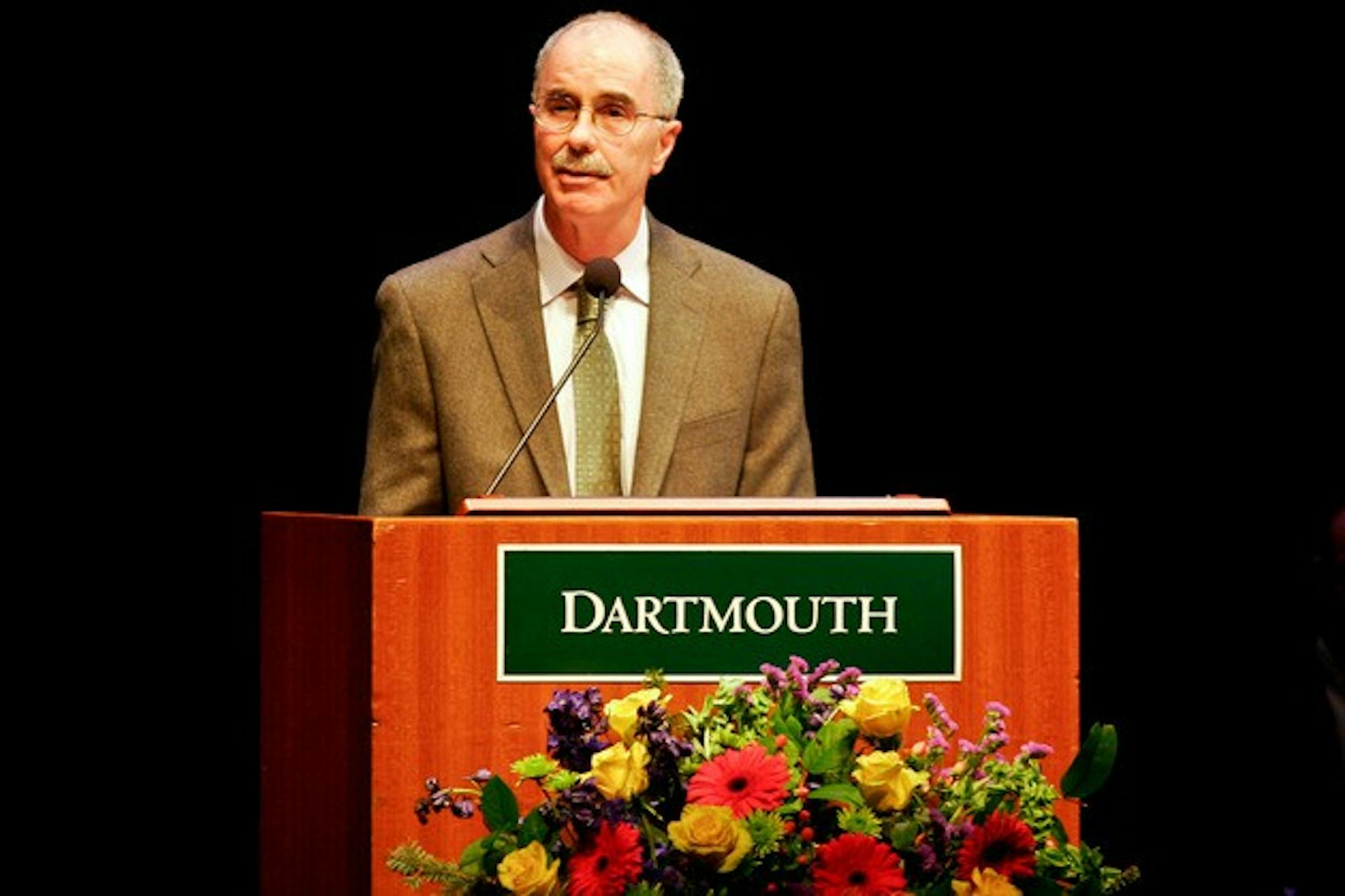Advances in information technology could help Dartmouth reach a global audience, increase faculty and student engagement, provide feedback about student learning methods and introduce new modes of collaboration, according to College President-elect Philip Hanlon '77, who sits on Coursera's advisory board.
When considering how to implement new online technologies, administrators must reflect on the College's institutional goals, which include providing an intimate education experience, Kim said.
"We're somewhat different, so it's really appropriate for Dartmouth to think hard about how we want to participate in this larger education movement," he said.
The College is approaching the trend cautiously, according to classics professor Roger Ulrich, a member of a newly formed committee organized by the Provost's Office to examine opportunities for online learning at Dartmouth.
The College considers itself a "high-touch" learning environment, and values student-faculty interaction, Ulrich said. Administrators aim to use technology to enhance classroom experiences.
Hanlon said that information technology has the potential to improve the College's undergraduate offerings.
"I don't view them as backing away from the kind of great education Dartmouth has always offered I view it as enhancing that," Hanlon said.
MOOCs, or massive open online courses, provide a new format for learning and allow universities to reach audiences much larger than traditionally possible, according to Kim. Brown University, Columbia University and the University of Pennsylvania have partnered with Coursera, while Harvard University and the Massachusetts Institute of Technology created an online education partnership known as edX.
Online courses provide students who normally would not be able to attend a university the chance to take college-level classes for free, according to Brown professor Philip Klein, who is currently preparing an online course titled "Coding the Matrix: Linear Algebra through Computer Science Applications," which will launch through Coursera in June.
Though MOOCs often use assessments that can be machine-graded, the criticism that online courses cannot teach creativity or critical thinking is unfair, Koller said. Coursera offers a variety of classes spanning from performance music to medicine and uses a peer review process that gives students the opportunity to understand multiple approaches to answering a question, she said.
"You only gain something if you realize that online teaching is a new medium," Koller said. "You shouldn't try to replicate the synchronous classroom experience."
Penn professor Robert Ghrist, who teaches a single variable calculus course through Coursera that launched on Jan. 7, said he was surprised by the sense of community among students in the course.
Students interact with one another on discussion boards and assist each other with assignments, he said. Approximately 50,000 students between the ages of nine and 70, hailing from over 40 countries, are currently enrolled in his class, Ghrist said.
Professors may experiment with different teaching theories and learn which are most effective while teaching MOOCs, Klein said.
"My hope is that this experience will help me improve my teaching of the course even the traditional Brown course," he said.
Harvard's online learning platform HarvardX, offered through edX, uses MOOCs to share academic content globally and explore how different technologies can enhance traditional classroom learning, according to HarvardX faculty director Robert Lue.
What separates edX from other online course providers is its approach to structuring online courses, Lue said.
Harvard is constantly exploring different methods of teaching, and each online course that HarvardX produces is an "experimental opportunity," according to Lue.
The technology that online courses employ could also lead to a "redefinition of what happens in the face-to-face classroom," he said.
Using a mix of online material and in-class activities a method titled "blended learning" allows professors to spend more time interacting with students, Kim said.
Dartmouth's Master of Health Care Delivery Science program already uses this format. Students spend six weeks out of the 18 month-long course on campus and participate in a combination of real-time conversations and discussion board-based activities during the rest of the program, according to Kim. This blended course allows students, most of whom are full-time professionals, to continue working while they are enrolled.
At the undergraduate level, professors can use blended learning to increase their classroom efficiency by posting videos of basic material online and spending time in the classroom interacting with students, Kim said.
There is a lot of "dead time" in the traditional classroom that could be eliminated if professors took advantage of online technology, according to Klein.
A "modular approach" to lecturing where professors post short but dense videos online for students to watch in their own time may increase the amount of material professors are able to cover and help them avoid spending class time reviewing the basics, according to Ghrist.
"There are some inefficiencies in the system that we can take care of really well with an online component," he said.
Increased reliance on online learning to teach basic material could reduce the amount of time students have to spend at universities and the types of classes enroll in. If high school students take advantage of MOOCs before matriculating at a university, they will have a much better idea of what they want to study and can start focusing on a discipline immediately, Ghrist said.
"It won't be necessary to spend a year and a half of your life in residence taking general education requirements," he said.
The size of classes at Dartmouth is unique and allows students to build strong relationships with faculty, an advantage that many students who study elsewhere do not receive, Kim said. Advances in online technology could render those traditional lecture classes obsolete. But while technological advances are transforming universities significantly, they are unlikely to uproot the traditional higher education model completely and the intimacy of a small class is difficult to recreate in an online environment, Koller said.
"Nobody wants to replace the wonderful things about a small liberal arts college that are working," Ulrich said.




